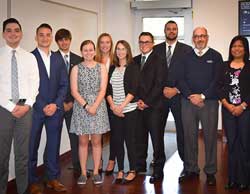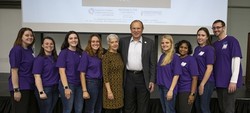The second semester of a high school financial literacy program, created and implemented by the Leon Hess Business School (LHBS), has been deemed a success by the University as it completes its second semester.
The program, which is designed to augment the personal financial literacy requirement for New Jersey high school students, was created by Janeth Merkle, MBA, MM, Associate Dean of LHBS, in the 2016 fall semester.
The program currently involves five high schools in Monmouth and Ocean counties, with more than 130 students participating after being selected through a competitive process. The selection criteria is developed by the University and the partner high schools. Seven University students also participate in the program, which is run by Merkle and Jeffrey Christakos, MBA, CPA, CFP, a specialist professor of accounting.
“I joined [the program] this year,” said Christakos. “I have spent much of my professional life in the financial planning area, so I thought that I could add value to the program. I am very grateful for the opportunity that I have been given to make a positive impact in the lives of our participants.”
According to information provided by Christakos, the program is designed to “empower and encourage high school students to be better prepared to control their personal finances to meet their life goals,” as well as providing University students with an opportunity to actively engage in applied learning through local community projects.
The workshops are provided to high school students in all grades for no cost on a weekly basis. LHBS covers the cost of the workshops, as well as the transportation of students to the University campus. The program was also partially funded by the New Jersey Manufacturers Insurance Group.
The weekly modules are taught by both students and faculty, and cover a wide variety of topics, including financial planning, budgeting, and personal financial management, as well as introducing high school students to a university environment. Each session is three hours long.
The students involved in the project are Katarena Brannick, Joseph Breen, Joseph Madaio, Vincent Miele, Gregory Nardiello, Kylie Seka, and Casey Selleroli. The students serve as instructors, teaching workshops alongside a faculty member. The students were recommended to the program by Walter Greason, Ph.D., Dean of the Honors School.
“Due to my work on financial literacy in their required HS310 course, they asked if I would recommend any students to participates,” said Greason, whose course “Business and Economic Development of the United States” taught about the impact of political and economic decisions on the structure of society. “Basic financial literacy is the first step towards responsible citizenship in the twenty-first century.”
“I served as a student instructor for the program this past semester,” said Breen. “The program gives students hands-on experience in areas such as budgeting and investing that will help them build a foundation in financial thinking and planning. Additionally, the concluding case study gave the students a means of not only reflecting on what they had learned, but applying the skills they had obtained.”
According to the program’s website, there are six modules taught. The first, “Goal Setting,” covers topics including discussions of short term versus long term goals, the Specific, Measurable, Attainable, Relevant, and Time Bound (SMART) model. Students also complete a goals worksheet. In the second module, “Career Planning,” students learn about planning for the future, exploring their interests, and how to be aware of potential opportunities and experience. In the third module, “Higher Education,” students learn about the benefits and opportunities provided by a college education, but also of the potential problems with hidden costs, student debt, and tuition.
The fourth module covers the importance of budgeting, as well as the components of a sound budget strategy, and includes the preparation of a personal budget. The fifth model, which explains investment and the “powerful concept” of compound interest. The sixth and final module explains the pros and cons of using credit cards and loans, as well as the difference between “good credit” and “bad credit.”
“Although some of the material may not have been relatable to the students now, it was important to open the door for them to see what their financial future could look like,” said Selleroli, who led classroom discussions during the program. “We try to interact with the students as much as possible… All of the modules that were taught involved situations that everyone faces at one time in their life.”
The 2016 pilot program was redesigned to include the above modules, as well as more interactive and engaging activities, according to Merkle’s comments in a University press release.
According to Christakos, the program will be offered again during the fall 2018 semester.
“We are looking to add additional high schools, as well as offer more courses,” he explained.
“I think the high schools were happy to offer such a program to their students, and the students hopefully enjoyed coming on campus to learn about what we had to offer,” Selleroli added. “The program will definitely be continuing in the future.”
The high schools currently participating are Asbury Park High School, Jackson Liberty High School, Keyport High School, Long Branch High School, and Manasquan High School.



